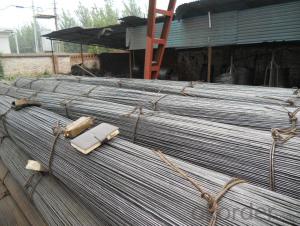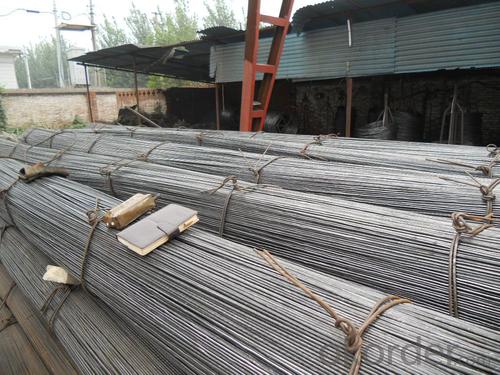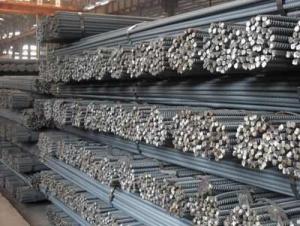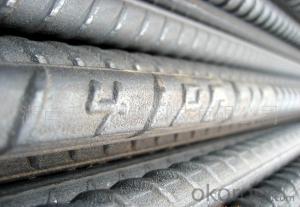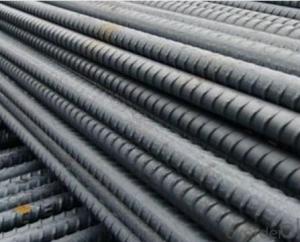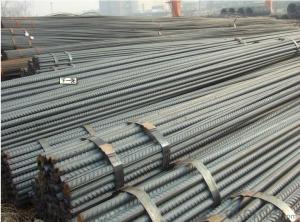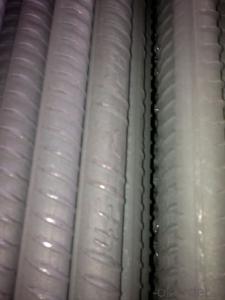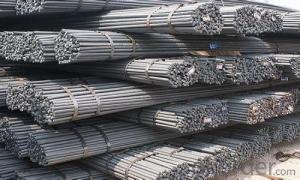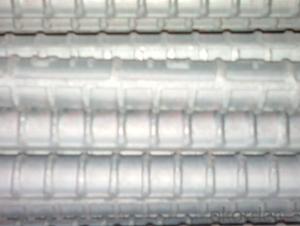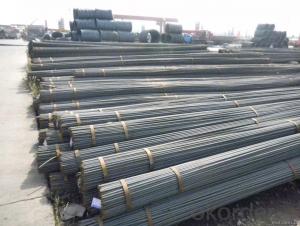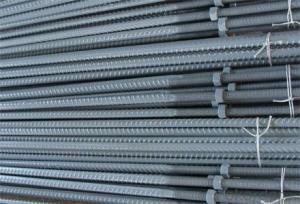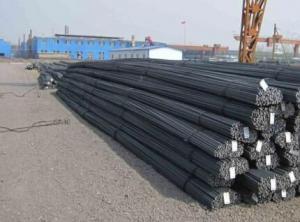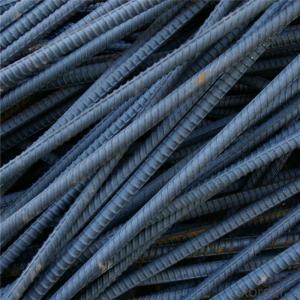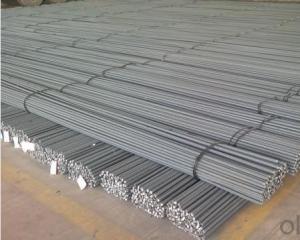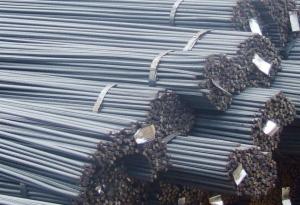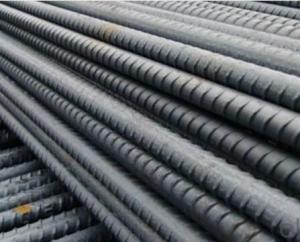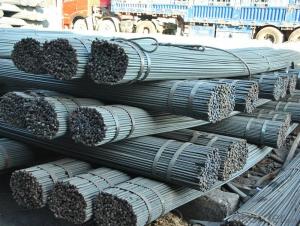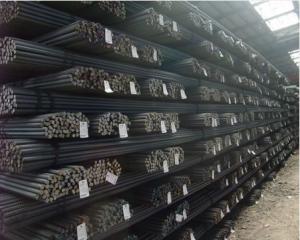Stainless Deformed Steel Rebars with High Quality of Steel Grade Gr60
- Loading Port:
- Tianjin
- Payment Terms:
- TT OR LC
- Min Order Qty:
- 100 m.t.
- Supply Capability:
- 5000 m.t./month
OKorder Service Pledge
OKorder Financial Service
You Might Also Like
Product Description:
OKorder is offering Stainless Deformed Steel Rebars with High Quality of Steel Grade Gr60 at great prices with worldwide shipping. Our supplier is a world-class manufacturer of steel, with our products utilized the world over. OKorder annually supplies products to European, North American and Asian markets. We provide quotations within 24 hours of receiving an inquiry and guarantee competitive prices.
Product Applications:
Stainless Deformed Steel Rebars with High Quality of Steel Grade Gr60 are ideal for structural applications and are widely used in the construction of buildings and bridges, and the manufacturing, petrochemical, and transportation industries.
Product Advantages:
OKorder's Stainless Deformed Steel Rebars with High Quality of Steel Grade Gr60 are durable, strong, and resist corrosion.
Main Product Features:
· Premium quality
· Prompt delivery & seaworthy packing (30 days after receiving deposit)
· Corrosion resistance
· Can be recycled and reused
· Mill test certification
· Professional Service
· Competitive pricing
Specifications of Stainless Deformed Steel Rebars with High Quality of Steel Grade Gr60:
Standard | GB UK USA | HRB335 HRB400 HRB500 G460B, B500A, B500B,B500C GR40, GR60 | |
Diameter | 6mm,8mm,10mm,12mm,14mm,16mm,18mm,20mm, 22mm,25mm,28mm,32mm,36mm,40mm,50mm | ||
Length | 6M, 9M,12M or as required | ||
Packing | Export standard packing: wrapped by wire rod in bundles | ||
Each bundle weight | 2-3MT, or as required | ||
Trade terms | FOB, CFR, CIF | ||
Payment terms | TT payment in advance or Irrevocable LC at sight. | ||
Delivery Detail | within 45 days after received advanced payment or LC. | ||
Brand name | DRAGON | ||
Theoretical weight and section area of each diameter as below for your information:
Diameter(mm) | Section area (mm²) | Mass(kg/m) | Weight of 12m (kg) | Pcs/ton |
6 | 28.27 | 0.222 | 2.664 | 375.38 |
8 | 50.27 | 0.395 | 4.74 | 210.97 |
10 | 78.54 | 0.617 | 7.404 | 135.06 |
12 | 113.1 | 0.888 | 10.656 | 93.84 |
14 | 153.9 | 1.21 | 14.52 | 68.87 |
16 | 201.1 | 1.58 | 18.96 | 52.74 |
18 | 254.5 | 2.00 | 24 | 41.67 |
20 | 314.2 | 2.47 | 29.64 | 33.74 |
22 | 380.1 | 2.98 | 35.76 | 27.96 |
25 | 490.9 | 3.85 | 46.2 | 21.65 |
28 | 615.8 | 4.83 | 57.96 | 17.25 |
32 | 804.2 | 6.31 | 75.72 | 13.21 |
36 | 1018 | 7.99 | 98.88 | 10.43 |
40 | 1257 | 9.87 | 118.44 | 8.44 |
50 | 1964 | 15.42 | 185.04 | 5.40 |
Chemical Composition: (Please kindly find our chemistry of our material based on JIS as below for your information)
JISG3112 SD390 | Chemical Composition | ||||
C | Mn | Si | S | P | |
0.22 | 1.38 | 0.4 | 0.014 | 0.022 | |
Physical capability | |||||
Yield Strength(N/cm²) | Tensile Strength(N/cm²) | Elongation (%) | |||
620 | ≥400 | 21 | |||
The production process of Stainless Deformed Steel Rebars with High Quality of Steel Grade Gr60
1-Waling beam furnace
2-Roughing rolling group
3-Intermediate rolling train
4-Finishing rolling group
5-Water-cooling device
6-Walking beam cooler
7-Finishing equipment(including the cold scale shear,short feet collection system,
automatic counting device,bundling machine, collect bench)
Usage and Applications of Stainless Deformed Steel Rebars with High Quality of Steel Grade Gr60:
Deformed bar is widely used in buildings, bridges, roads and other engineering construction. Big to highways, railways, bridges, culverts, tunnels, public facilities such as flood control, dam, small to housing construction, beam, column, wall and the foundation of the plate, deformed bar is an integral structure material. With the development of world economy and the vigorous development of infrastructure construction, real estate, the demand for deformed bar will be larger and larger..
Packaging & Delivery of Stainless Deformed Steel Rebars with High Quality of Steel Grade Gr60:
Packaging Detail: products are packed in bundle and then shipped by container or bulk vessel, deformed bar is usually naked strapping delivery, when storing, please pay attention to moisture proof. The performance of rust will produce adverse effect.
Price: Keep lower operating costs so as to offer competitive price for our clients
FAQ:
Q1: Why buy Materials & Equipment from OKorder.com?
A1: All products offered byOKorder.com are carefully selected from China's most reliable manufacturing enterprises. Through its ISO certifications, OKorder.com adheres to the highest standards and a commitment to supply chain safety and customer satisfaction.
Q2: How do we guarantee the quality of our products?
A2: We have established an advanced quality management system which conducts strict quality tests at every step, from raw materials to the final product. At the same time, we provide extensive follow-up service assurances as required.
Q3: How soon can we receive the product after purchase?
A3: Within three days of placing an order, we will begin production. The specific shipping date is dependent upon international and government factors, but is typically 7 to 10 workdays.
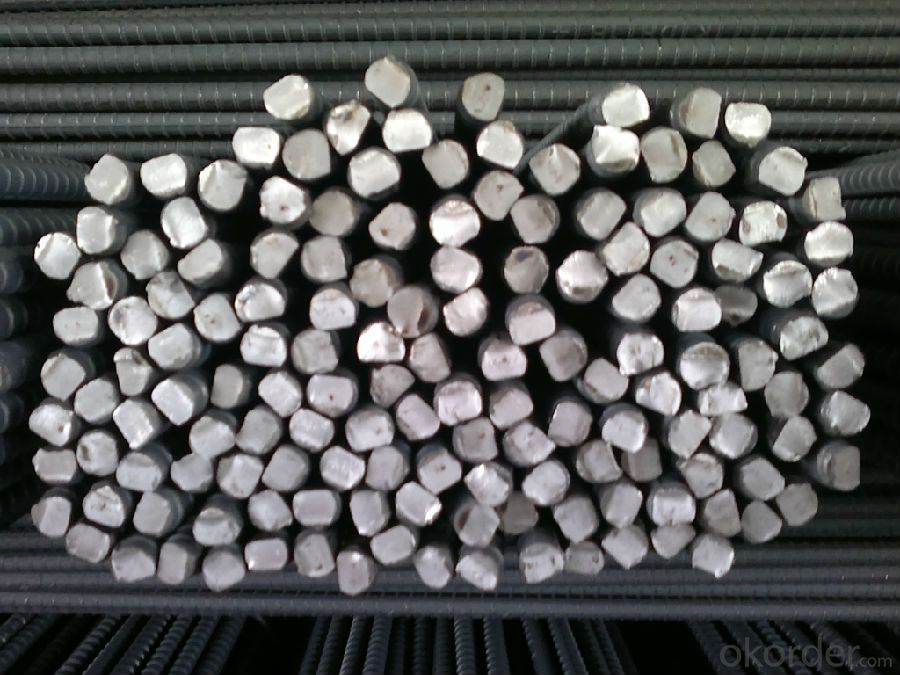
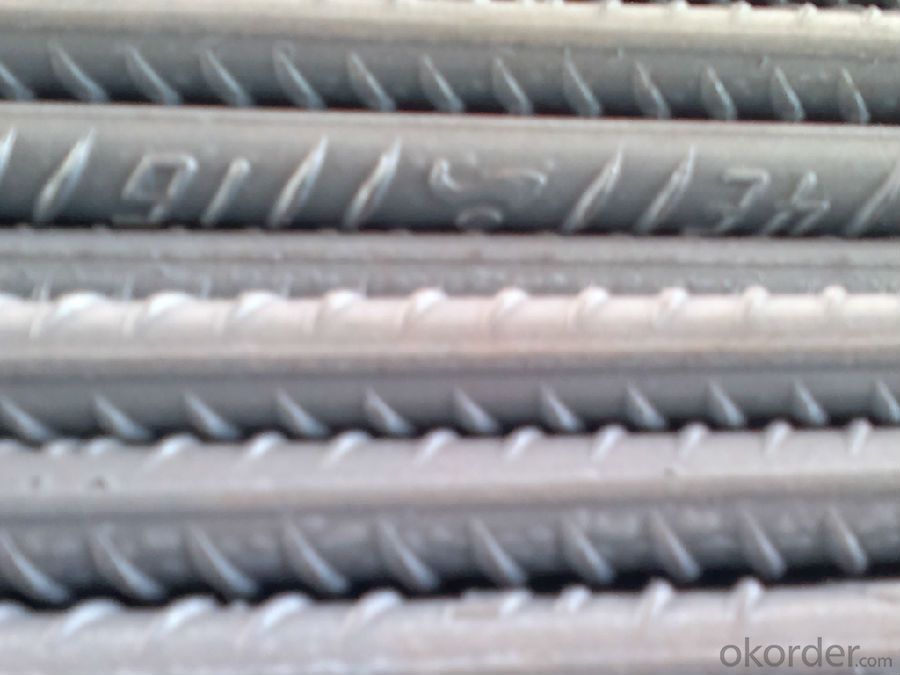
- Q: Are there any standards or codes governing the use of steel rebars in construction?
- Yes, there are several standards and codes that govern the use of steel rebars in construction. For example, the most widely recognized standard is the ASTM A615/A615M, which outlines the requirements for deformed carbon-steel bars for concrete reinforcement. Additionally, various building codes such as the International Building Code (IBC) and local building regulations often reference these standards to ensure the safe and proper use of steel rebars in construction projects.
- Q: How do steel rebars resist corrosion?
- Passivation is the process by which steel rebars resist corrosion. When exposed to air and moisture, a thin layer of iron oxide is formed on the surface of the steel. This layer, commonly known as rust, acts as a protective barrier, preventing oxygen and moisture from reaching the inner layers of steel and halting further oxidation. To provide an additional layer of protection against corrosion, steel rebars are often coated with materials like epoxy or zinc. These coatings create a physical barrier, shielding the steel from the corrosive elements of the environment. Regular maintenance, which includes cleaning and applying protective coatings, can also contribute to prolonging the lifespan of steel rebars and preventing corrosion.
- Q: How are steel rebars protected against alkali attacks?
- Various techniques and materials are used to protect steel rebars from alkali attacks. One commonly employed method involves the application of a protective coating onto the surface of the rebars. This coating acts as a barrier, preventing direct contact between the steel and the alkaline environment. Epoxy, zinc, and polyethylene are frequently utilized coatings that are designed to provide long-lasting protection against alkali attacks. Another approach to safeguarding rebars is the use of corrosion inhibitors. These inhibitors are added to the concrete mixture during construction and work by reducing the corrosive effects of alkali on the rebars. By forming a protective film on the steel surface, corrosion inhibitors prevent alkali from reaching the rebar and causing damage. In addition to coatings and corrosion inhibitors, the proper design of the concrete mix is also essential in protecting rebars from alkali attacks. By optimizing the composition of the concrete mix, engineers can decrease the alkalinity of the surrounding environment, thereby minimizing the risk of alkali attacks and subsequent corrosion. To ensure the continued protection of steel rebars against alkali attacks, regular maintenance and inspection of structures are crucial. It is essential to monitor the condition of the rebars and promptly address any signs of corrosion or damage, as this is vital to their long-term durability. In summary, the combination of protective coatings, corrosion inhibitors, proper concrete mix design, and regular maintenance are key factors in safeguarding steel rebars against alkali attacks. By implementing these measures, the lifespan and structural integrity of concrete structures can be significantly extended.
- Q: Are steel rebars fire-resistant?
- Yes, steel rebars are fire-resistant. Due to their high melting point and the protective oxide layer that forms when exposed to heat, steel rebars can withstand high temperatures and maintain their structural integrity during a fire.
- Q: What is the role of steel rebars in preventing concrete cracking?
- The role of steel rebars in preventing concrete cracking is to provide reinforcement and strength to the concrete structure. By adding steel rebars, which are embedded within the concrete, it helps distribute the tensile forces and resist cracking caused by shrinkage, temperature changes, and external loads. The rebars act as a skeletal framework, enhancing the overall durability, stability, and resistance to cracking of the concrete.
- Q: Can steel rebars be used in precast or prestressed concrete?
- Yes, steel rebars can be used in both precast and prestressed concrete. Rebars are commonly used in these construction methods to provide reinforcement and enhance the strength and durability of the concrete structures.
- Q: Can steel rebars be used in water treatment facilities?
- Yes, steel rebars can be used in water treatment facilities. Steel rebars, or reinforcing bars, are commonly used in construction projects to strengthen concrete structures. In water treatment facilities, where concrete is used for various structures such as tanks, basins, and pipelines, steel rebars are often incorporated to provide added strength and durability. Water treatment facilities involve the treatment of water to make it safe for consumption or other purposes. Concrete is a preferred material in these facilities due to its ability to withstand the harsh conditions of water treatment processes, such as exposure to chemicals, high temperatures, and pressure. Steel rebars are essential in reinforcing the concrete structures to ensure they can withstand these demanding conditions. The corrosion resistance of steel rebars is a critical factor to consider when using them in water treatment facilities. Since water treatment facilities often involve the use of chemicals and exposure to moisture, it is important to choose rebars that have appropriate corrosion protection. This can be achieved by using stainless steel rebars or by applying protective coatings to the rebars. It is also worth noting that proper design, construction, and maintenance practices are essential in ensuring the long-term performance of steel rebars in water treatment facilities. Adequate cover thickness, concrete quality, and proper installation techniques are important considerations to prevent corrosion and ensure the rebars provide the desired structural integrity. In conclusion, steel rebars can be effectively used in water treatment facilities to reinforce concrete structures and provide the necessary strength and durability. However, it is important to choose corrosion-resistant rebars and adhere to proper design and construction practices to ensure their long-term performance in these facilities.
- Q: Are steel rebars resistant to chemicals?
- Yes, steel rebars are generally resistant to chemicals. The corrosion resistance properties of steel rebars make them suitable for use in various chemical environments. However, exposure to certain aggressive chemicals or environments may lead to corrosion over time, so it is essential to consider the specific conditions and choose the appropriate type of steel or protective coatings accordingly.
- Q: What is the difference between steel rebars and steel mesh?
- Concrete structures in construction projects commonly use steel rebars and steel mesh to reinforce them. However, there are notable distinctions regarding their design and application. Steel rebars, also called reinforcing bars, are lengthy cylindrical steel rods. They are typically employed to provide tensile strength to concrete structures. These rebars are usually arranged in a grid-like pattern within the concrete, preventing cracks and improving the overall structural integrity. Rebars come in various sizes and are used in applications where significant tensile force is anticipated, such as columns, beams, and slabs. On the other hand, steel mesh, also known as wire mesh or welded wire fabric, consists of interconnected steel wires that are welded together to create a grid-like pattern. This mesh is usually produced in large rolls and can be easily cut or bent into the desired shape. Steel mesh primarily offers both tensile and shear strength to concrete structures. It is commonly used in applications where a lower amount of tensile force is expected, like walls, foundations, and pavements. Regarding installation, steel rebars are usually placed and secured within the concrete formwork prior to pouring the concrete. They are positioned at specific locations according to the structural design requirements. Conversely, steel mesh is laid on top of the formwork or within the concrete pour itself, providing reinforcement throughout the entire concrete structure. Both steel rebars and steel mesh possess their own advantages and disadvantages. Rebars provide greater tensile strength and are excellent for applications involving heavy loads or high amounts of force. However, they can be more time-consuming and labor-intensive to install due to the individual placement and tying process. On the other hand, steel mesh offers easier and faster installation due to its continuous form, making it more commonly used in smaller-scale projects or applications with lighter loads. In conclusion, while both steel rebars and steel mesh serve the purpose of reinforcing concrete structures, they differ in terms of design, installation method, and application. The choice between rebars and mesh depends on specific structural requirements, project scale, and load expectations. It is advisable to consult with a structural engineer or construction professional to determine the most suitable reinforcement solution for a particular project.
- Q: Can steel rebars be used in the construction of swimming pools or water tanks?
- Steel rebars have the capability to be utilized in the construction of swimming pools or water tanks. They are often employed as reinforcement in concrete structures, thereby enhancing their strength and durability. In the process of constructing swimming pools or water tanks, it is customary to insert steel rebars within the concrete walls and floors to impart additional support and avert cracking or structural failure. These rebars are specifically designed to endure the corrosive impact of water and effectively reinforce the concrete structure against the water's force. Nevertheless, it is crucial to ensure that the steel rebars are suitably coated or safeguarded in order to prevent corrosion, as continuous exposure to water can eventually result in rust. By incorporating steel rebars into the construction of swimming pools or water tanks, the overall integrity and lifespan of the structures can be significantly augmented.
Send your message to us
Stainless Deformed Steel Rebars with High Quality of Steel Grade Gr60
- Loading Port:
- Tianjin
- Payment Terms:
- TT OR LC
- Min Order Qty:
- 100 m.t.
- Supply Capability:
- 5000 m.t./month
OKorder Service Pledge
OKorder Financial Service
Similar products
Hot products
Hot Searches
Related keywords
